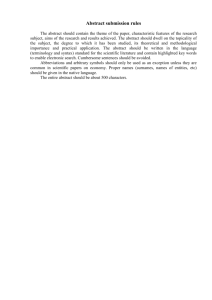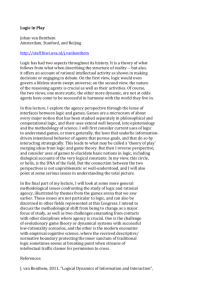Jan Marontate School of Communication Simon Fraser University
advertisement
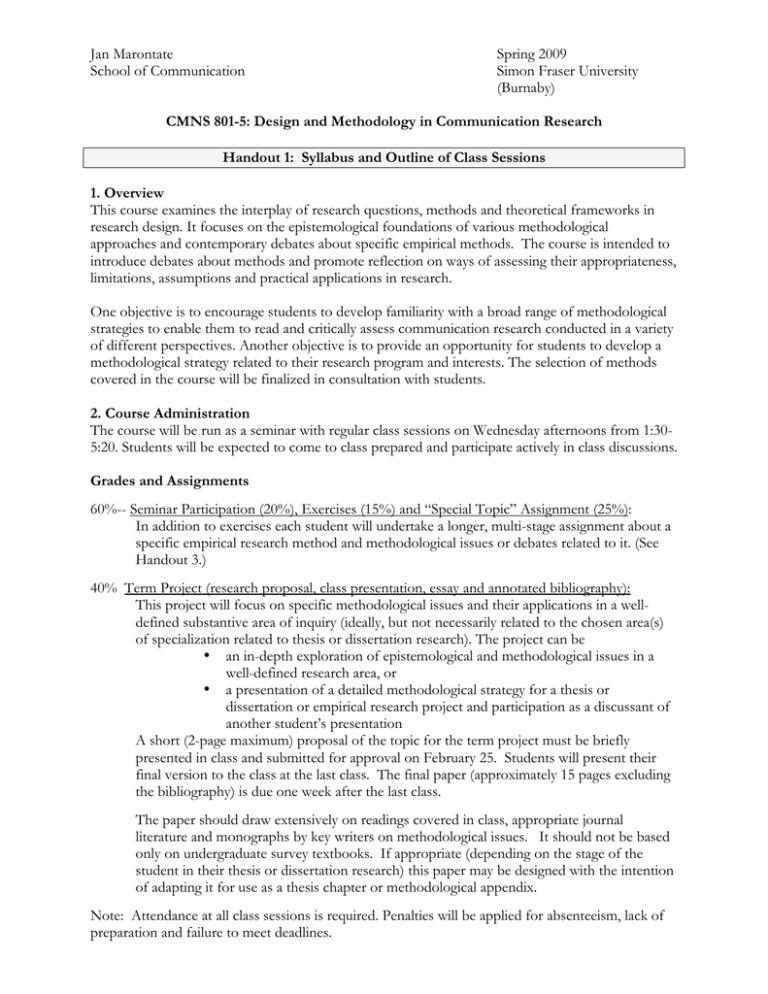
Jan Marontate School of Communication Spring 2009 Simon Fraser University (Burnaby) CMNS 801-5: Design and Methodology in Communication Research Handout 1: Syllabus and Outline of Class Sessions 1. Overview This course examines the interplay of research questions, methods and theoretical frameworks in research design. It focuses on the epistemological foundations of various methodological approaches and contemporary debates about specific empirical methods. The course is intended to introduce debates about methods and promote reflection on ways of assessing their appropriateness, limitations, assumptions and practical applications in research. One objective is to encourage students to develop familiarity with a broad range of methodological strategies to enable them to read and critically assess communication research conducted in a variety of different perspectives. Another objective is to provide an opportunity for students to develop a methodological strategy related to their research program and interests. The selection of methods covered in the course will be finalized in consultation with students. 2. Course Administration The course will be run as a seminar with regular class sessions on Wednesday afternoons from 1:305:20. Students will be expected to come to class prepared and participate actively in class discussions. Grades and Assignments 60%-- Seminar Participation (20%), Exercises (15%) and “Special Topic” Assignment (25%): In addition to exercises each student will undertake a longer, multi-stage assignment about a specific empirical research method and methodological issues or debates related to it. (See Handout 3.) 40% Term Project (research proposal, class presentation, essay and annotated bibliography): This project will focus on specific methodological issues and their applications in a welldefined substantive area of inquiry (ideally, but not necessarily related to the chosen area(s) of specialization related to thesis or dissertation research). The project can be • an in-depth exploration of epistemological and methodological issues in a well-defined research area, or • a presentation of a detailed methodological strategy for a thesis or dissertation or empirical research project and participation as a discussant of another student’s presentation A short (2-page maximum) proposal of the topic for the term project must be briefly presented in class and submitted for approval on February 25. Students will present their final version to the class at the last class. The final paper (approximately 15 pages excluding the bibliography) is due one week after the last class. The paper should draw extensively on readings covered in class, appropriate journal literature and monographs by key writers on methodological issues. It should not be based only on undergraduate survey textbooks. If appropriate (depending on the stage of the student in their thesis or dissertation research) this paper may be designed with the intention of adapting it for use as a thesis chapter or methodological appendix. Note: Attendance at all class sessions is required. Penalties will be applied for absenteeism, lack of preparation and failure to meet deadlines. 2 Required Readings Required readings (and many recommended readings) will be put on reserve or made available electronically. Some course materials will be posted on the course site: https://webdav.sfu.ca/web/cmns/courses/marontate/2009/801 or http://webdav.sfu.ca/web/cmns/courses/marontate/2009/801 (varies with location and type of computer) To access this folder you must log on to the SFU computer system. Students should expect to do a substantial amount of reading each week. Exact choices will be finalized in consultation with the class. Resources for “brushing up” on Terminology & Concepts in Research Design and Methodology Most students will find it necessary to look up basic terminology from time to time. Undergraduate methodology courses are often rather selective in their coverage. Technical terms or concepts that have not been used often can be easy to forget. As well some words used in everyday language have specific meanings in the context of particular methodological strategies (like ‘reliable’, ‘valid’, ‘random’ and ‘representative’). In addition to the required readings students should familiarize themselves with an appropriate introductory survey text in social science methodology suited to their research agenda. During the first two weeks of classes skim through at least one comprehensive general methodology textbook and examine Trochim’s website (listed below) to understand the way it is organized. This will help you prepare to use it to learn (or refresh your memory of) basic terminology and concepts as you encounter them throughout the term. Widely-used general introductory survey texts vary in their approaches but usually include helpful glossaries of terms and descriptions of basic concepts, among them: • Neuman, W.L. (1999) Social Research Methods. Qualitative and Quantitative Approaches, Allyn and Bacon, and • Babbie, E. (2007) The Practice of Social Research. Thomson Wadsworth. Some introductory methodology textbooks written from specific perspectives also cover basic terminology, such as: • Reinharz, Shulamit with L. Davidman. (1992) Feminist Methods in Social Research, New York : Oxford University Press, 1992. There is a useful, simple introduction to social science methodology intended for undergraduates with definitions of key terms written by W. Trochim of Cornell University available on-line: • http://www.socialresearchmethods.net/kb/ The course is intended to help you engage with more advanced issues in methodological design. For more detailed information about terminology, concepts and debates about methodological design you will need to turn to monographs about specific methods and journal articles. Some introductory textbooks (like the one by Neuman listed above) provide short bibliographies pointing to key texts related to specific methods. We will be devoting some class time to ways of searching for information about methodological debates and trends. 3 Tentative Schedule of Class Sessions Changes and more details will be announced in class Part I : Introduction to advanced studies in methodology. Week 1. Introduction to the Course. Week 2. Paradigms and models relevant to the classification of methodological and historical traditions of empirical research Required Readings Guba, E. and Y. Lincoln. (2004) “Competing Paradigms in Qualitative Research:Theories and Issues” in Hesse-Biber, S and P. Leavy (ed.) Approaches to Qualitative Research. A reader on Theory and Practice. Oxford, pp.17-38. Bruhn Jensen, K. (2002) “The complementarity of qualitative and quantitative methodologies in media and communication research”, in Bruhl Jensen, K (ed.) A Handbook of Media and Communication Research, Routledge. pp. 254-272. Case Studies about Competing Methodologies (Read about at least one conflict): 1- Debate about Cultural Studies and Social Scientific Methods Haraway, D. (1990). “Teddy bear patriarchy: taxidermy in the Garden of Eden, New York City, 1908-36”, In Primate Visions: Gender, race and nature in the world of modern science. New York: Routledge. Shudson, M. (1997). “Paper tigers: A Sociologist follows cultural studies into the wilderness”, Lingua Franca: The Review of Academic Life, 7(6), 49-56. 2- “The Social Text Hoax” Alan Sokal’s website: http://www.physics.nyu.edu/faculty/sokal/ Browse this to familiarize yourself with some debates surrounding the ‘hoax’. Recommended Reading (about paradigms, relationships between methods and theory, and why people write methodology texts): Thomas Kuhn. (1962) “The Nature and Necessity of Scientific Revolutions” Excerpts from The Structure of Scientific Revolutions. U. Chicago Press. http://www.marxists.org/reference/subject/philosophy/works/us/kuhn.htm Bruno Latour, (1997) “Crisis”, We have never been modern. Cambridge U. Press. pp. 1-12. Platt, Jennifer. (1996) “Writing on Method” and “Theory and practice” in A history of sociological research methods in America, 1920-1960. Cambridge: Cambridge U. Press, pp. 1-67, 106-142. (Not on reserve but in Bennett library collection) Heyer, Paul. (1988) Chapters 1-2, Communications and History. Greenwood, pp. 1-37. Law, John. (2004) After Method: Mess in Social Science Research, London: Routledge. (Not on reserve but in Bennett library collection) 4 Marx, Karl. Grundrisse: Foundations of the Critique of Political Economy. http://www.marxists.org/archive/marx/works/1857/grundrisse/ch01.htm SchrØder, K., K. Drotnew, S. Kline and C. Murray. (2003) “Methodological pluralism: the Meta-theoretical foundations of discursive realism”, Researching Audiences. New York: Arnold. Weber, Max (1994 reprint) “The Methodological Foundations of Sociology” excerpted from Sociological Writings, Wolf Heydebrand (ed.), Continuum, (especially “Objectivity in Social Science”) http://www.marxists.org/reference/subject/philosophy/works/ge/weber.htm#s2 Week 3: The Place of Commitment, Bias & Reflexivity in Methodologies/ Secret and Sacred Knowledge/ Research Ethics in the 21st Century Required: Christians, C. (2005) “Ethics and Politics in Qualitative Research” in Denzin and Lincoln Handbook of Qualitative Research (erd Edition). pp. 139-164. Crisp, J. (1999) " 'Who has counted the refugees?' UNHCR and the politics of numbers " New Issues in Refugee Research, Working Paper No. 12. UNHCR, Geneva And one of Mattingly, C. (2005) “Toward a vulnerable ethics of research practice”, Health: An Interdisciplinary Journal for the Social Study of Health, Illness and Medicine. Vol 9(4): pp. 453-471. or Menzies, Charles R. (2004) “Putting Words into Action: Negotiating Collaborative Research in Gitxaala”, Canadian Journal of Native Education, Volume 28(1-2):15-32. http://www.ecoknow.ca/journal/15.html Recommended: Hammersley, M. and Gomm, R. (1997) 'Bias in Social Research', Sociological Research Online, vol. 2, no. 1, http://www.socresonline.org.uk/2/1/2.html Harding, S. (2004) “How Standpoint Methodology Informs Philosophy of Social Science”, in Hesse-Biber, S and P. Leavy (ed.) Approaches to Qualitative Research. A reader on Theory and Practice. Oxford, pp. 62-80. Marcus, George E. (1998) “Censorship in the Heart of Difference: Cultural Property, Indigenous Peoples’ Movements, and Challenges to Western Liberal Thought” in Post, Robert (ed.) Censorship and Silencing: Practices of Cultural Regulation. Santa Monica: Getty Research Institute, pp. 221-242. Michaels, Eric. (1994) “A Primer of Restrictions on Picture-Taking in Traditional Areas of Aboriginal Australia”, Bad Aboriginal Art. Tradition, Media and Cultural Horizons. Minneapolis: U. Minnesota Press, pp. 1-18. 5 Part Two: Selected Topics in Research Methodology Weeks 4-10 : Part of each class in this section will be devoted to critical assessments of methodological issues related to a specific type of method or empirical research strategy (see Handout 2). Students will each be responsible for helping to design the focus and select readings for the class session on the topic they choose. Choices of general themes (centred on specific methods) will be finalized in the second class. Once the themes are chosen students are encouraged to research specific debates in applications of these methods to communication research. A preliminary list of specific (but deliberately broad) research methods follows: • • • • • • • • Interviews Oral History Surveys Focus Groups Ethnography Field Research and Participant Observation Critical Discourse Analysis Content Analysis • • • • • • • Unobtrusive Measures Using Existing Records Historical and Archival Research New Information Technologies in Data Collection & Analysis Social Network Analysis Visual Methodologies Quasi-Experimental Research Other topics may be suggested. Part 3: Case Studies Weeks 11-13 Round Tables with presentations and discussions of term projects on methodological issues related to substantive areas. ____________________________________________________________ The School expects that the grades awarded in this course will bear some reasonable relation to established university-wide practices with respect to both levels and distribution of grades. In addition, the School will follow Policy T10.02 with respect to “Intellectual Honesty” and “Academic Discipline”. (See the current Calendar, General Regulations Section).
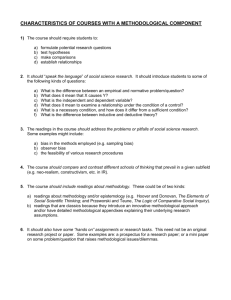

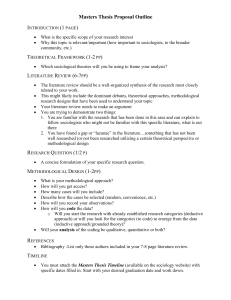
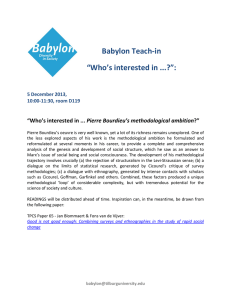
![Introduction [max 1 pg]](http://s3.studylib.net/store/data/006997862_1-296d918cc45a340197a9fc289a260d45-300x300.png)
